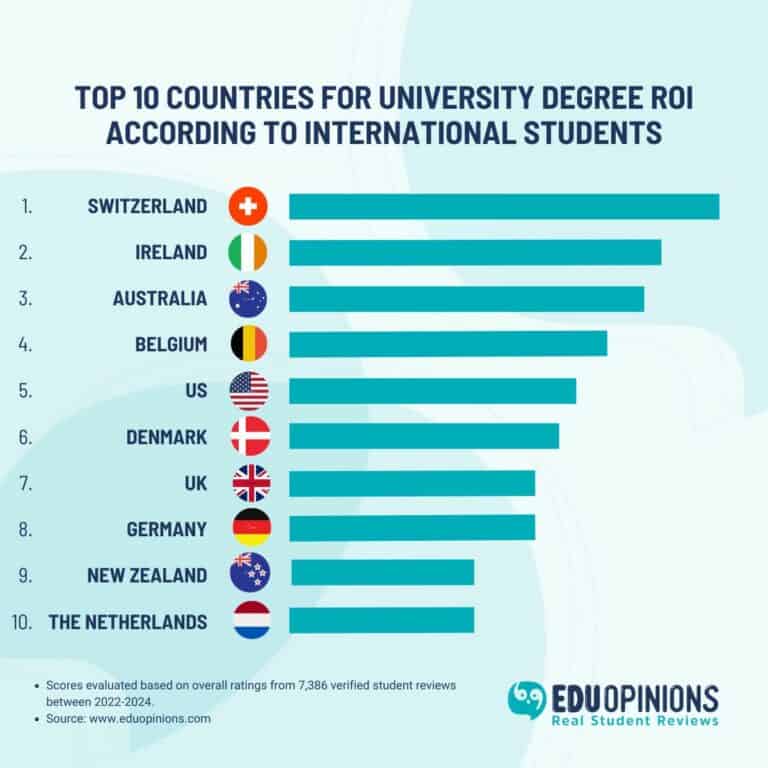When you’re trying to decide which university to attend, there are many places you can go to for advice and guidance. You might talk to friends, family, and alumni, or read student reviews. However, for many prospective students, university rankings are another source of guidance. But how reliable are university rankings really?
University rankings typically rank universities according to supposedly objective factors such as employment rates, quality of research, and how international they are. However, the exact data that goes into rankings differs per research body, which means that every ranking will be slightly different.
As a result, it can be difficult to tell if rankings are to be trusted. To help you, we’ll guide you through exactly what university rankings are and whether you should use them to make your decision.
What are university rankings?

Research bodies publish university rankings annually, and they use a variety of data points to grade universities on their quality. As mentioned, this usually includes data on research, employment, student happiness, internationalism, and graduate salaries.
The results of the most popular university rankings in the world carry a lot of weight. Historically, students and employers have used rankings to determine which universities are world-leading. Reputations are made and lost in global rankings.
There are lots of global and local university rankings out there, but some of the most popular include:
- Times Higher Education’s World University Rankings
- Shanghai University’s Academic Ranking of World Universities
- QS Rankings
- US News Rankings
Alongside the results of each ranking, you’ll usually find a ‘methodology’ section, which describes how the organisation has calculated the overall ranking.
Are University rankings reliable?
University rankings have gained a reputation for being a trusted way of determining the quality of a university. However, this isn’t always the case, and it isn’t always helpful to make your entire decision based on rankings alone.
Here are a few factors you need to consider to evaluate whether university rankings are reliable or not.
Are they Representative?
For starters, university rankings represent a skewed perception of the global higher education landscape. For instance, there are over 18,000 higher education colleges and universities worldwide. A ranking in the top 500 alone would represent being in the top 3% of global institutions – an incredible achievement. However, many students look to the top 100 (or even the top 50) in a ranking to make their decisions.
How are they calculated?
Many rankings feature different universities. This is partly because some smaller institutions may not hit the criteria to feature on lists, especially if they’re new institutions. Can you really judge a university if it isn’t included in a ranking? This gets even more tricky considering each ranking has a different set of criteria to be top-ranked. This means universities may appear in drastically different places on similar-looking rankings.
Can They Measure Quality?
While all rankings use a different methodology, they usually rely on similar data to make their decision. This data is usually geared towards the experiences of graduates – for example, how many scholarly publications alumni are featured in, or how much graduates earn after their courses. They can’t tell you the personal experience of each student at that university, such as the quality of the campus, how students learn, or whether the location of the university is good.
University Rankings Scandals

In recent years, many institutions have decided that rankings shouldn’t be given the prestige they have in the past. Most recently, Yale, Harvard, Columbia, and Georgetown’s law schools have withdrawn from the popular US News ranking of the best law schools in the country.
This is because, in the past, research has found that some universities deliberately misreported data to the US News rankings, skewing the results in their favour. In 2018, US News removed Temple University from its MBA rankings because of false data reporting. Ivy League institution Columbia University tumbled 16 places in the latest US News colleges ranking because of rumours of false reporting.
This should tell you that rankings can be temperamental, reflecting other issues aside from a university’s quality.
Conclusions About University Rankings
In some ways, university rankings can be very helpful. The data they use (provided it’s accurate, of course) can give you useful insights into the student body, professors, research goals, and internationalism of a university. However, it might not be helpful for you to base your entire decision around this data.
Remember, all rankings are calculated differently. As a result, if you do want to research rankings as part of your decision, it’s worth referring to a few different ones. Similarly, you might wish to review the methodology to find out why particular universities came out on top.
In the end, rankings can help you review specific data regarding a university’s global reputation. However, to make such a personal decision, it’s worth referring to many different resources, including personal student stories and alumni experiences.
EDUopinions collects verified student reviews for universities across the globe to help you make a more informed decision about the university.
Related Posts :
Recent Posts

The moment you transfer the first tuition fee payment to your university, you'll be thinking of how you can recoup that investment. This is ...

For professionals with a few years' experience already, an MBA can be a great way of boosting your career prospects. From changing jobs or industries ...

Studying abroad for a semester or a full year can be an incredibly enriching experience. You'll get to experience a new culture, meet new people, and ...







